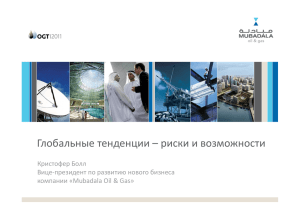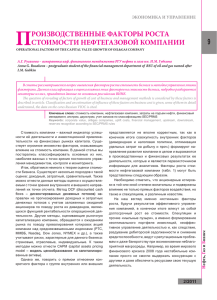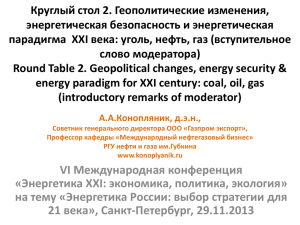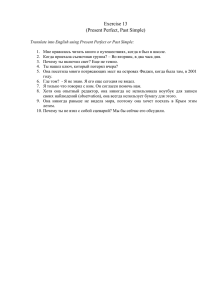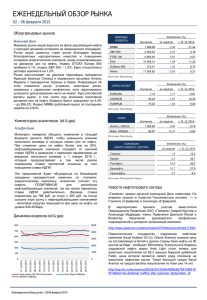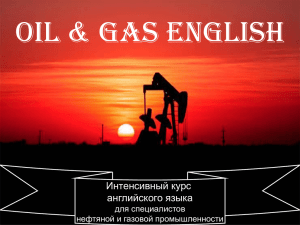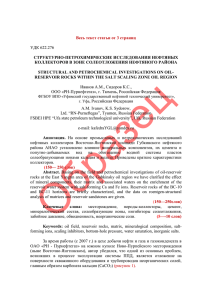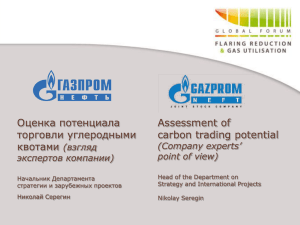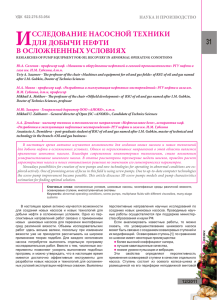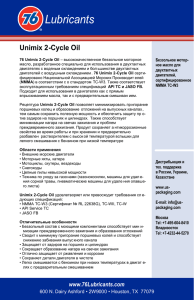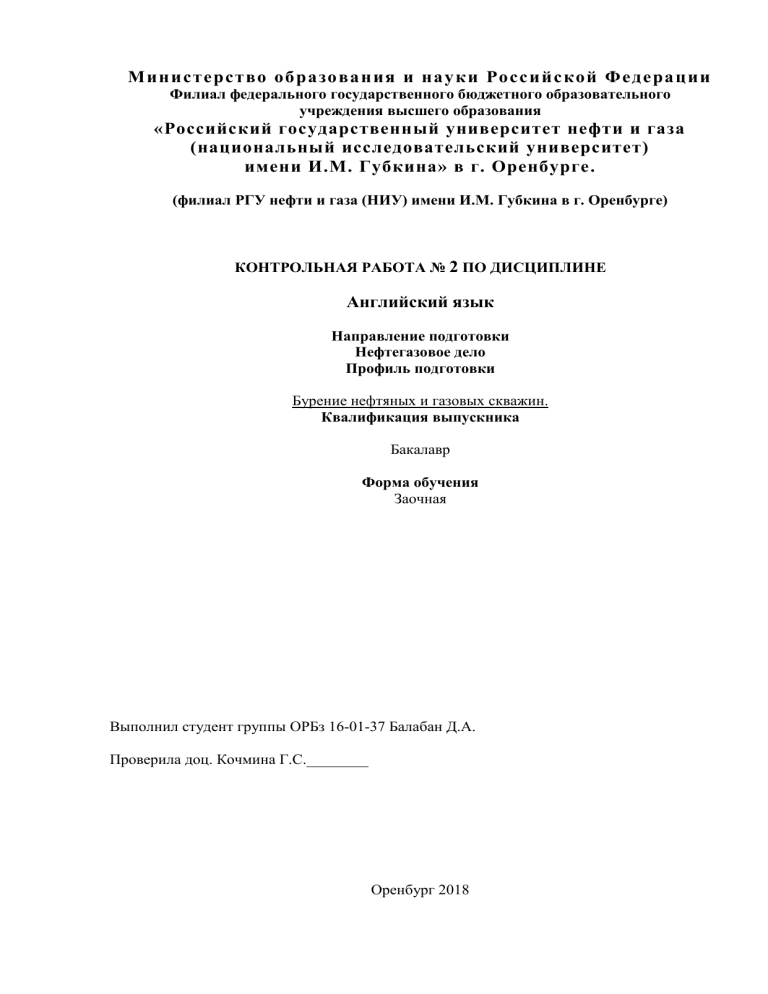
Министе рст во об разо ва ния и нау ки Росс ийс кой Фе де ра ции Филиал федерального государственного бюджетного образовательного учреждения высшего образования «Российский государственный университет нефти и газа (национальный исследовательский университет) имени И.М. Губкина» в г. Оренбурге. (филиал РГУ нефти и газа (НИУ) имени И.М. Губкина в г. Оренбурге) КОНТРОЛЬНАЯ РАБОТА № 2 ПО ДИСЦИПЛИНЕ Английский язык Направление подготовки Нефтегазовое дело Профиль подготовки Бурение нефтяных и газовых скважин. Квалификация выпускника Бакалавр Форма обучения Заочная Выполнил студент группы ОРБз 16-01-37 Балабан Д.А. Проверила доц. Кочмина Г.С.________ Оренбург 2018 Упр. 1. Формы Continuous (Present, Past, Future) и Perfect (Present, Past, Future) в действительном (Active) и страдательном (Passive) залогах. (A) Перепишите предложения и переведите их. Выпишите сказуемые и укажите их видовременные формы. 1) It has not been possible to 1) Невозможно точно determine the exact origin определить, потому что because it has not been possible невозможно определить точное to identify the exact place or место или материал из которых materials from which any возникло какое-либо particular oil accumulation накопление нефти. originated. has- Present Perfect Passive. 2) Have you made an estimate of 2) Вы давали оценку возможным расходам? the likely costs? have- Present Perfect Active. 3) Today, relations have been established with over 50 countries and over 55 enterprises with foreign capital are working here now. have- Present Perfect Passive. 3) Сегодня, установлены связи более чем с 50 странами и более 55 предприятиями с иностранным капиталом, работающих сейчас здесь. 4) Most of the world’s petroleum had been found trapped in porous rocks under relatively impermeable formations. had- Past Perfect Passive. 4) Большая часть нефти мира была найдена (пойманной) в пористых породах относительно непроницаемых образований. 5) We have been working on this project for two years. have- Present Perfect Active. 5) Мы работаем над этим проектом два года. (В) Перепишите предложения, поставив глагол в нужную форму, и переведите их. 1) Geologists, geophysicists, geochemists and paleontologists study what have been happened to rocks that may be buried thousands of meters below surface and how to identify traps where oil and gas accumulated within rock formations. to happen ‒ Present Perfect Passive. 1) Геологи, геофизики, геохимики и палеонтологи изучают, что произошло с камнями, которые могут быть зарыты на тысячи метров ниже поверхности и как определить места (жили) в которых нефть и газ накапливаются в горных породах. 2) Contracts worth billions of dollars had been signed with the newly independent countries and many joint ventures have been established to develop the region’s oil and gas fields. to sign ‒ Past Perfect Passive. 2) Контракты стоимостью миллиарды долларов были подписаны с новыми независимыми странами и много совместных предприятий созданы для разработки нефтегазовых месторождений региона. 3) Geologists search for oil and gas by studying rock formations and using microscopes to examine rocks fragments from wells that are being drilled. to drill ‒ Present Continuous Passive. 3) Геологи ищут нефть и газ изучая горные образования и используя микроскопы для изучения фрагментов горных пород из скважин которые бурятся. 4) Petroleum belongs to the minerals that have been used by humanity since the earliest ages, earlier than metals and coal, and for numerous different purposes. to use – Present Perfect Passive. 4) Нефть принадлежит минералам которые использовались человечеством с ранних веков, ранее чем металлы и уголь, и для многочисленных различных целей. 5) Our cars will probably use stored energy from batteries and many scientists are working to develop cars that will run on hydrogen. to work – Present Continuous Active. 5) Наши машины вероятно, будут использовать запасенную энергия из батарей и многие ученые работают над развитием автомобилей которые будут ездить на водороде. Упр. 2. Модальные Глаголы. Составьте предложения из двух частей, обращая внимание на перевод глаголов must, should, can, may, need. Получившиеся предложения переведите. 1) An explorer may have a well- 1) Геологоразведчик должен иметь developed theory or intuition why хорошо обоснованную теорию или an area should contain oil and gas. интуицию, почему площадь должна содержать нефть и газ. 2) Geophysicists can identify the structure, configuration, thickness and depth of new sedimentary basins. 2) Геофизики могут идентифицировать структуру, конфигурацию, толщину и глубина новых осадочных бассейнов. 3) If everything goes according to the plan we should be able to keep to the schedule. 3) Если все идет согласно плану, мы должны придерживаться графику. 4) You don’t need to write the report I gave already done it 4) Вам не нужно писать отчет, я уже сделал это. 5) I really have to fill in my time- 5) Я действительно должен sheet or else they won’t pay me заполнить табель или в противном this month. случае, они не оплатят мне этот месяц. Упр. 3. Причастие I Перепишите предложения и переведите их. Подчеркните причастия. 1) The ammeter is a measuring 1) Амперметр-это device. измерительное устройство. 2) Being taken in proper proportion, hydrogen and oxygen combine forming water. 2) Принимая правильную пропорцию, водород и кислород превращаются в воду. 3) The forces acting between atoms within a molecule are very strong. 3) Силы действующие между атомами внутри молекулы очень сильны. 4) When speaking of water, we must remember that it is composed of tiny particles- its molecules. 4) Говоря о воде, мы должны помнить что она состоит из крошечных частиц-ее молекул. 5) Having been detained by a snow storm, the liner was three days late. 5) Задержавшийся снежной бурей, лайнер опоздал на три дня. Упр. 4. Причастие II Перепишите предложения и переведите их. Подчеркните причастия. 1) The explorer’s first step is to 1) Первым шагом исследователя examine all the information является проверка всей already known about the area. информации, уже известной о площади. 2) Having constructed the new 2) Построив новое здание separator’s building, our company сепарации, наша компания could meet the local standards. могла соответствовать местным стандартам. 3) The prices for oil having risen, the specialists continued to analyze this situation. I saw our drillers watching the site. 3) Цены на нефть возрасли, специалисты продолжают анализировать эту ситуацию. Я видел наших буровиков смотрящих сайт. 4) Having successfully solved the problem of a site location for the pump station, our specialists could work out the methods of planning the new project. 4) Успешно решив проблему расположения площадки для насосной станции, наши специалисты смогли разработать методы планирования нового проекта. 5) I was told of their having been sent to the rescue operation. 5) Я был уведомлен об их отправке на спасательную операцию. Упр. 5. Задайте разделительные и альтернативные вопросы к следующим предложениям. 1) Reducing the cost of drilling results in lowering oil prices. - Reducing the cost of drilling results in lowering oil prices, doesn’t it? - Does reducing the cost of drilling results in lowering oil prices or in another cause? 2) Oil being stored in depleted reservoirs is a well-known fact. - Oil being stored in depleted reservoirs is a well-known fact, isn’t it? - Is oil being stored in depleted reservoirs a well-known fact or not? 3) Apart from teaching I.M. Gubkin was engaged in research work. - Apart from teaching I.M. Gubkin was engaged in research work, wasn’t he? - Was I.M. Gubkin engaged in research work apart from teaching or engaged in drilling work? 4) No wells are drilled without accumulating and interpreting geophysical information. - No wells are drilled without accumulating and interpreting geophysical information, aren’t they? - Are wells drilled without accumulating and interpreting geophysical information or just accumulating information? 5) It is worth mentioning that earlier natural gas was considered a useless oil byproduct. - It is worth mentioning that earlier natural gas was considered a useless oil byproduct, wasn’t it? - Was earlier natural gas a useless oil byproduct or a useful oil byproduct? Упр. 6. (A) Прочитайте текст и устно переведите его. Выполните упражнения, данные после текста, письменно. MAIN JOBS IN OIL & GAS INDUSTRY (1) Geologists are employed to explore for crude oil and natural gas and to help develop reservoirs. Geologists search for oil and gas by studying rock formations and using microscopes to examine rocks fragments (cuttings) from wells that are being drilled. Geologists develop surface and subsurface maps to locate oil and gas resources. They locate rock layers cropping out on the surface of the ground in order to locate anticlines and domes. Geologists use data from existing wells to make subsurface maps of the reservoir rocks. By matching rock layers between wells, they can draw cross sections to find petroleum traps. (2) Geologists study the physical aspects and history of the Earth. They identify and examine rocks, study information collected by remote sensing instruments in satellites, conduct geological surveys; construct field maps, analyze information collected through seismic studies, and use instruments to measure the earth’s gravity and magnetic field. Geologists study the composition, structure, and history of the earth’s crust. They try to find out how rocks were formed and what has happened to them since formation. (3) Geology and geophysics are closely related fields. Geophysicists use the principles of physics, mathematics, and chemistry to study not only the earth’s surface, but its internal composition, ground and surface waters, atmosphere, oceans, and its magnetic, electrical, and gravitational forces. Geophysicists use three methods of oil exploration: magnetic, gravity, and seismic exploration. In magnetic exploration a magnetometer is used to determine the strength of the earth’s magnetic field at a specific point on the earth’s surface. In gravity exploration a gravity meter, or gravimeter, is used to determine the strength of the earth’s gravity at a specific location. (4) Geophysicists may specialize in areas such as geodesy, seismology, or marine geophysics, also known as physical oceanography. Geodesists study the size and shape of the earth, its gravitational field, tides, polar motion, and rotation. Seismologists interpret data from seismographs and other geophysical instruments to detect earthquakes and locate earthquake-related faults. Geomagnetists measure the Earth’s magnetic field and use measurements taken over the past few centuries to devise theoretical models to explain its origin. Найдите в тексте английские следующих слов и фраз: 1. разрабатывать месторождения 2. используя микроскопы 3. структурная карта подземного рельефа 4. геологические изыскания 5. сила тяжести 6. морская геофизика 7. движение полюсов 8. толковать данные 9. создавать теоретические модели 10. объяснить его происхождение (B) 1) develop reservoirs 2) using microscopes 3) subsurface maps 4) geological surveys 5) gravitational force 6) marine geophysics 7) polar motion 8) interpret data 9) devise theoretical models 10) explain its origin эквиваленты (С) Письменно переведите на русский язык абзацы 3,4 текста A. (3) Геология и геофизика тесно связанны с месторождениями. Геофизики используют законы физики, математики и химии, чтобы изучать не только поверхность земли, но ее внутреннюю структуру, грунтовые и поверхностные воды, атмосферу, океаны, и ее магнитные, электрические и гравитационные силы. Геофизики используют три метода разведки нефти: магнитные, гравитационные и сейсмические исследования. В магнитном исследовании, магнитометр используется для определения силы земных магнитных полей в определенных точках поверхности земли. В гравитационном исследовании гравитометр, или гравиметр, используется для определения силы земной гравитации в определенном местоположении. (4) Геофизика может специализироваться на области, как геодезия, сейсмология или морские геофизики, так же известная как физическая океанография. Геодезисты изучают размер и форму земли, ее гравитационные поля, приливы, движение полюсов и вращение. Сейсмологи толкуют данные с сейсмографов и с других геофизических приборов (инструментов) для выявления землетрясений и обнаруживать связанные с землетрясением разломы, последствия. Геомагнетики измеряют земные магнитные поля и используют измерения взятые более чем за несколько последних веков, для разработки теоретической модели для объяснения происхождения этого.
